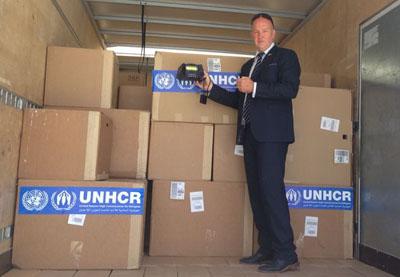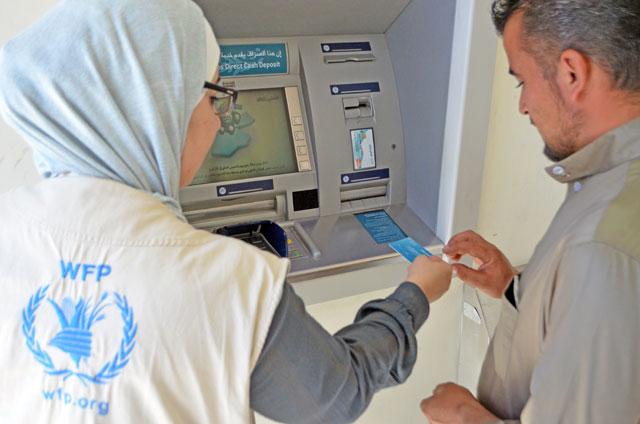You are here
UNHCR provides Interior Ministry with 108 iris scanners for refugee registration
By Khetam Malkawi - Jul 07,2014 - Last updated at Jul 07,2014

AMMAN — The UNHCR on Monday said it is expanding the registration of Syrian refugees in Jordan using iris recognition technology through providing iris scanners worth JD700,000 to authorities to ensure their availability at the Kingdom’s police stations.
The UNHCR handed over 100 units of “high tech equipment” to the Interior Ministry on Monday in order to ensure that every Syrian refugee in the Kingdom is registered through biometrics, according to a statement sent to The Jordan Times.
Since the introduction of the technology almost a year ago, 460,000 Syrian refugees in Jordan have been registered using iris scanners, according to UNHCR Representative to Jordan Andrew Harper.
The technology has since been implemented in other host countries including Iraq, Turkey and Lebanon. Currently, some 1 million Syrians in the region have been registered through this technology, Harper added.
“Using iris scan technology countrywide will help us considerably in our efforts to protect Syrian refugees,” he said.
“It will allow early identification of persons with specific needs, such as unaccompanied minors, vulnerable women or survivors of torture, and to channel the assistance that they deserve,” the UN official added, noting that the biometrics “also allows us to cut down on double registration and fraud”.
Given the increasing challenges, it is also essential for UNHCR to recognise the government’s legitimate security concerns and “ensure that our registration system, as is our partnership, is watertight”, Harper said.
He added that one of the key objectives for using this technology is to prevent duplication of registration.
“If a refugee moved from Jordan to Egypt, we can know that this is the same person,” he said, adding that even if a person changed his name “we can know that he is the same person.”
The contribution includes 108 iris cameras, 20 card printers and service card consumables for 500,000 individuals, according to the UNHCR statement.
It was a timely example of the international community supporting Jordan in a practical way, according to Brig. Gen. Wadah Hmoud, director of the Syrian Refugees Affairs Directorate.
He noted that it is critical that refugees in Jordan are properly registered in order for the government to continue to be able to offer them the necessary protection and assistance.
“UNHCR will [also] train officers on the use of the iris technology,” the statement said, adding that 108 police stations countrywide will be connected to a central server, setting up regular data exchange mechanisms between UNHCR and the Public Security Department.
Registration is the first essential step in protecting Syrians seeking refuge in Jordan as it allows identifying refugees and providing them with the Interior Ministry’s service cards that grant access to free health and education services.
The equipment is part of projects developed and implemented by Jordan and UNHCR at a cost of JD2.8 million to improve the joint registration of Syrian refugees. They are mostly funded by the UK’s Department for International Development and the US government, according to the UN agency.
Iris scan technology is already used in Ribaa Sarhan, the entry point for all new arrivals from Syria, and in the Zaatari camp in Mafraq, some 80km northeast of Amman.
Related Articles
AMMAN — The UN World Food Programme (WFP) in Jordan has launched an iris scan payment system allowing Syrian refugees living in camps to pur
AMMAN — Over 10,000 people in Azraq refugee camps are now able to pay for their food by means of entitlements recorded on a blockchain-based
The total number of Syrian refugees registered with UNHCR in Jordan reached 585,656 individuals by January 12, according to a report issued by the UN agency on Monday.















